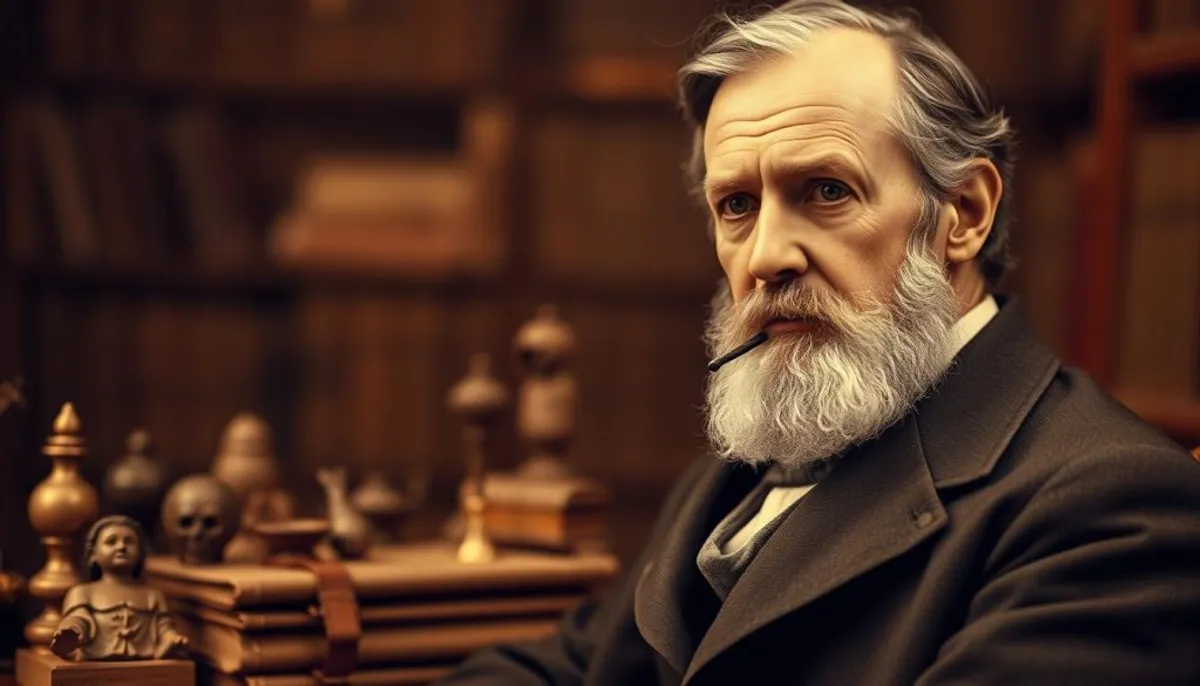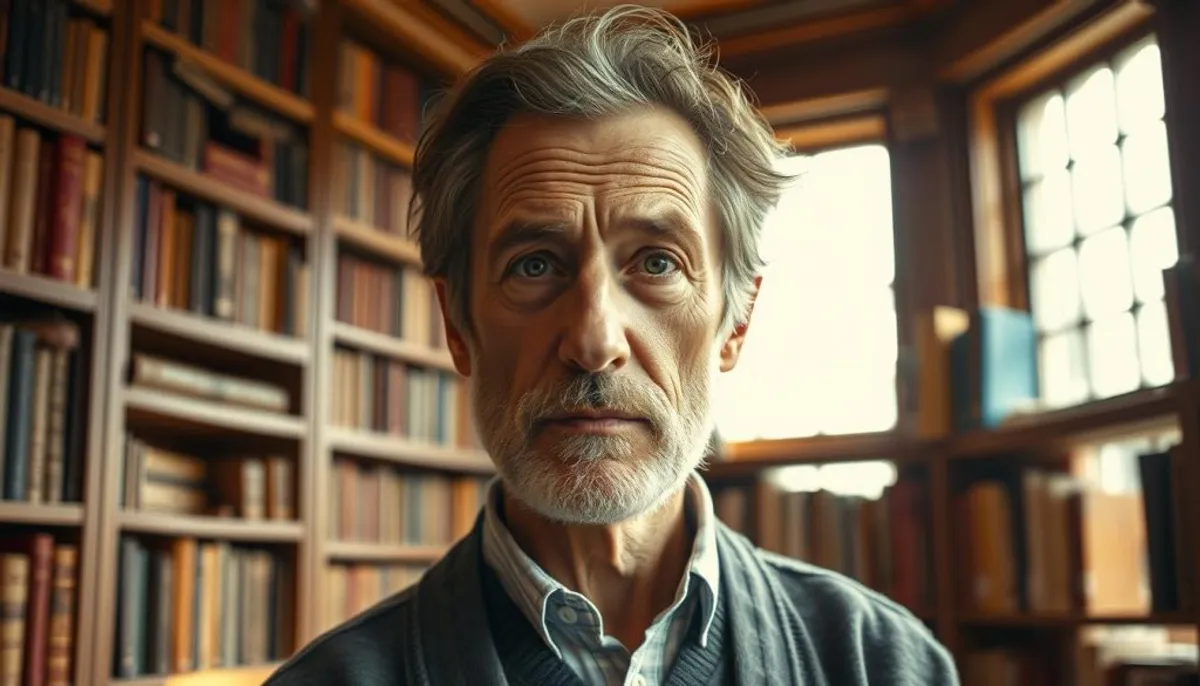Edward Burnett Tylor, an emblematic figure of cultural anthropology, has marked the history of this discipline. Born in 1832 in Camberwell, this British pioneer laid the foundations of our modern understanding of culture.

Tylor revolutionized the thinking of his time by proposing a definition of culture that encompasses all human groups. His innovative vision, presented in his work “Primitive Culture” in 1871, laid the groundwork for cultural anthropology as we know it today.
What is culture according to Tylor? It is a complex set that includes knowledge, beliefs, the arts, morality, laws, and customs acquired by humans as members of a society. This definition paved the way for a broader and more inclusive understanding of cultural diversity.
The first holder of the anthropology chair at the University of Oxford in 1895, Tylor helped shape the discipline. His comparative approach to societies and his statistical treatment of ethnographic data influenced generations of anthropologists.
What is culture according to Tylor
In 1871, Edward Burnett Tylor revolutionized the anthropological conception of culture. His defining work transformed our understanding of this complex phenomenon, just as the ideas of Guy Rocher also influenced anthropological thought.
The fundamental definition of 1871
In “Primitive Culture,” Tylor offers a comprehensive view of culture. He defines it as “a complex whole, encompassing sciences, beliefs, arts, morality, laws, customs, and other habits acquired by man in social state.”
This definition broke with previous ideas. Tylor emphasizes the importance of cultural diversity, showing that these aspects are socially acquired, not naturally. He brings together knowledge, arts, morality, and customs into a coherent whole.
Social heritage is central to this perspective. Tylor insists on the transmission and acquisition of culture within society. This vision has profoundly influenced modern cultural anthropology.
Tylor's definition remains relevant today. It encourages us to see culture as a complex and dynamic system. It enriches our understanding of human societies in all their diversity.
Edward Burnett Tylor: the journey of a pioneering anthropologist
Edward Burnett Tylor, born in 1832 in Camberwell, United Kingdom, is an emblematic figure of anthropology. Coming from a wealthy Quaker family, Tylor developed an early interest in the study of cultures.
Education and intellectual influences
Tylor's education was marked by his travels and encounters. In 1856, he explored Mexico, a journey that profoundly influenced his vision of the comprehensive complex of culture. This experience led to the publication of “Anahuac” in 1861, his first major work.

The knowledge and beliefs of the societies he studied fascinated Tylor. He developed a comparative approach to cultures, particularly focusing on the evolution of practices and ideas. This methodology is reflected in his landmark work “Primitive Culture,” published in 1871.
Tylor was appointed the first holder of the anthropology chair at the University of Oxford in 1896, thus dedicating his pioneering role in the discipline. His definition of culture as a complex set of knowledge, beliefs, arts, laws, and customs acquired by the individual in society remains fundamental in anthropology.
The components of culture in Tylor's vision
Tylor's vision of culture encompasses a vast array of elements. These elements shape social life. This innovative approach has profoundly marked modern anthropology.
Knowledge and beliefs
According to Tylor, knowledge and beliefs are the pillars of culture. They are transmitted socially, forming the intellectual foundation of a society. Art, as a creative expression, plays an essential role in this transmission.
Morality, laws, and customs are also key components. They govern behaviors and interactions within a community. Transmitted from generation to generation, they ensure social cohesion.
Tylor's vision emphasizes social and mental transmission rather than biological. This perspective highlights the importance of learning and education. It underscores their role in shaping the cultural identity of a group.
| Component | Role in culture |
|---|---|
| Knowledge | Intellectual foundation of society |
| Beliefs | System of shared values |
| Art | Creative expression and cultural transmission |
| Morality | Guide to social behaviors |
| Law | Legal framework of society |
| Customs | Traditional practices transmitted |
This holistic view of culture has paved the way for a more complete understanding of human societies. It has lasting influenced the field of anthropology.
Social heritage and cultural transmission
Tylor's thought on culture emphasizes the importance of social heritage. He considers cultural capabilities as acquired, transmitted rather than natural. This perspective has profoundly influenced 19th-century anthropology.
Cultural transmission is primarily ensured by family and school. These institutions are essential for transmitting knowledge, values, and customs from one generation to the next.
Social heritage manifests in various ways. Explicit culture includes material and concrete aspects. In contrast, implicit culture concerns latent values and feelings. This distinction highlights the complexity of cultural transmission.
| Characteristics of culture | Description |
|---|---|
| Coherent whole | Interdependent elements |
| Imbuement | In all human activities |
| Community | Shared within a group |
| Transmission | Through socialization |
Cultural transmission is marked by a dynamic of continuity and change. Tylor emphasizes the importance of shedding cultural survivals while recognizing their presence. This illustrates the challenges of maintaining culture in the face of societal evolutions.
The anthropological dimension of culture
Cultural anthropology, introduced by Edward B. Tylor, revolutionized our understanding of culture. It laid the foundations for a scientific methodology to study human societies.
The comparative approach to societies
Tylor adopted a comparative method to analyze various cultures. This approach aimed to highlight the similarities and differences between societies. It sought to demonstrate the diversity of humanity, affirming the fundamental unity of the species through cultural variability.
This perspective has profoundly influenced the evolution of modern anthropology. It dismissed polygenist theories, which posited the existence of innate differences between peoples. Tylor, on the contrary, argued that all human beings share a culture, regardless of their origin.
Tylor's definition of culture in 1871 remains essential. It defines culture as the knowledge, beliefs, arts, laws, and customs acquired by man in a society. This vision underscores the universality of culture while recognizing its diversity.
Tylor's legacy continues to influence current research on cultural practices. For example, the French Ministry of Culture conducts decennial surveys on the cultural habits of the French. These studies reveal the impact of social and educational factors on cultural practices, highlighting the complexity of cultural dynamics in our modern societies.
The impact of Tylor's definition on modern anthropology
Tylor's definition of culture has profoundly influenced modern anthropology. His holistic approach has allowed for a broader understanding of human societies. Today's anthropologists rely on this foundation while enriching it with new perspectives.
Tylor's impact is evident in the study of cultures. An analysis of ten case studies in different countries shows varied approaches. However, they are all influenced by his holistic vision.
| Country | Dominant approach |
|---|---|
| France | Strong emphasis on the teaching of history |
| Japan | Mix of tradition and critique |
| Colombia | Focus on collective memory |
Tylor's definition remains a reference point. However, it is enriched by new reflections, including safety culture analysis. Modern anthropologists are interested in the dynamics of cultural transmission and interactions between societies.

Tylor's legacy is evident in the debates on the teaching of history. In many countries, there is a tension between a traditional approach and a more critical approach. This tension reflects the complexity of the notion of culture.
Conclusion
Tylor's definition of culture was a turning point in anthropology. It included knowledge, beliefs, and customs, laying the groundwork for modern understanding. This anthropological legacy continues to influence our perception of cultural diversity.
Tylor's approach, although old, remains relevant in our globalized world. It emphasizes that culture is a complex set, acquired by humans in society. This perspective invites us to value the richness of traditions and practices that shape our collective identity.
By reflecting on Tylor's legacy, we better understand the evolution of our understanding of culture. Today, we recognize the dynamic and fluid nature of cultures. This reminds us of the importance of social heritage and cultural transmission, as Tylor emphasized.
Let us explore and celebrate the cultural diversity that surrounds us, keeping in mind the foundations laid by Tylor. His definition of culture remains a valuable starting point for understanding and appreciating the richness of human experience in all its variety.
RelatedRelated articles


